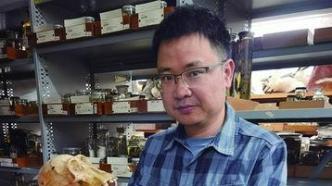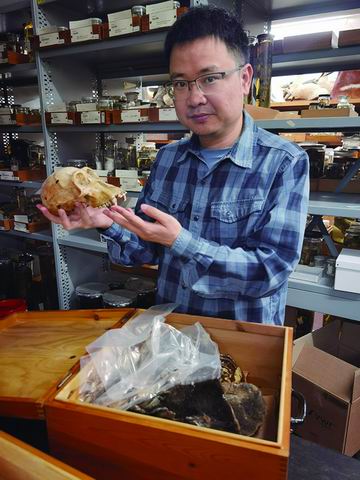

Zhang Guojie examines chimpanzee specimens. Photo provided by the interviewee
Thirteen years ago, Zhang Guojie, who had just graduated with a Ph.D., traveled all over the world with an unshaven beard and dust, just to launch the 10,000-species bird genome project, and "lobbyed" the scientific research team to cooperate with him.
He usually doesn't talk much, and he is not a typical "social cow", but he always likes to gather scientists from home and abroad to "do business".
It took Zhang Guojie 4 years from the failure to apply for the first project funding until he received an invitation from the editorial department of Science in 2014 to publish 8 research papers on the evolutionary lineage of birds and comparative genomics in a special issue at one time.
In June of this year, Zhang Guojie, who is already a professor at the Life Evolution Research Center of Zhejiang University, and Wu Dongdong, a researcher at the Kunming Institute of Zoology, Chinese Academy of Sciences, took the initiative to "ask" the editorial department of "Science" for a special research issue, and published 8 at a time. papers. At the same time, another 3 papers were published in "Science Advances" and "Nature-Ecology and Evolution".
This time, they co-sponsored a primate genome project and formed the International Primate Research Consortium. Since 2018, the collaborative team has analyzed the genome data of 50 species of primates in 14 families and 38 genera, covering the main groups of primates.
"The extent of our field of vision determines our understanding of the objective world, and the scale of data we generate and our ability to mine data determine the boundaries of human vision." He said in an exclusive interview with "Chinese Journal of Science".
Two special issues of "Science" were organized
"Chinese Journal of Science" : Why did you launch the Primate Genome Project and set up the International Primate Research Alliance?
Zhang Guojie : This project was initiated by Wu Dongdong and I in 2018, when I was a visiting researcher at the Kunming Institute of Zoology, Chinese Academy of Sciences. The Institute has always taken primate genome research as a key research direction.
Our genome contains both the unique variation that arose during human evolution and the genetic background that was shaped by the long evolution of primates. By comparing genomes, it is not only possible to answer the origin of primate species including humans, but also to describe in detail the evolution and variation patterns of each gene and each base in our body, so as to provide a basis for understanding the origin of human innovation traits and diseases. mechanism provides important references.
Although many teams at home and abroad are doing research on primate evolution, there is still a lack of larger-scale comparative analysis. Especially in China, primate species are not rich in resources, and a large number of samples are distributed in Africa and South America, and some species are very rare. Therefore, we need to form an international alliance to jointly produce and share these basic data resources.
"Chinese Journal of Science" : Why did "Science" launch a special issue? What kind of submission process did the team go through?
Zhang Guojie : It is the tradition of journals such as Science and Nature to publish special issues around major scientific research themes. These topics often require multidisciplinary research.
There are two ways to organize a special issue. One is initiated by the editorial department of the journal, and they often search for and track such topics at some important international conferences. The 2014 bird project special issue is the editor who found us. Another kind, like this time, is that the research team actively contacted the editorial department of "Science" after completing the project analysis work. We submitted a total of 12 papers for review this time, and finally accepted 8 papers. The whole process took more than a year.
"Chinese Journal of Science" : In 2010, when the 10,000 Bird Genome Project was launched, it was very difficult to apply for project funding. Is the support for this international cooperation project sufficient?
Zhang Guojie : At this stage, the main source of research funding for this type of project is the independent application of each team, which is relatively loose and lacks organized and planned project operations at the national level.
In fact, there are currently many large-scale genome projects in the world, all of which are promoted by the official level of various countries. From a national strategic point of view, it is very important to collect species genome resources. It is like a mine. Whoever generates a large amount of data first has the priority and leading right to mine these data.
It is meaningless to rank the importance of different subjects
"Chinese Journal of Science" : Under the general trend of data-driven research, is data priority or problem priority?
Zhang Guojie : A good comparative genomics research must start from the problems or hypotheses of evolutionary biology. At present, the data output capability in the genomics field is very strong, but the efficiency and ability to mine data need to be improved. The key factor is whether the core scientific problems to be solved by the project can be clearly known at the beginning of the research. This depends on researchers continuously accumulating multidisciplinary knowledge, knowing where to look for problems, what new data to collect, and being able to establish connections between problems and data.
"China Science Daily" : Now there is a view that molecular biology is an absolutely strong discipline, while traditional paleontology, ethology, and ecology are becoming more and more marginalized in the genome era. What do you think of this "competition" between disciplines? "?
Zhang Guojie : The competition you mentioned mostly arises when fighting for resource allocation. If any biological phenomenon is viewed systematically and completely, the mechanism discovery brought about by molecular biology is equally important as the historical process of the phenomenon's emergence in evolutionary biology.
In this special issue, there is a very eye-catching work led by the team of Northwestern University professor Qi Xiaoguang. Through comparative genomics, fossil evidence, combined with paleoclimate geography and verification of cell biology experiments, the research team solved the core question of "Why do Asian langurs have a hierarchical society with different organizational levels such as family, family, and clan?" . The completion of such an excellent interdisciplinary research is inseparable from the synchronous collaboration of various disciplines. It can be seen that it is meaningless to rank the importance of different disciplines.
Lack of evolutionary biology perspective in China
"China Science Daily" : A year ago, you mentioned in an interview that the international community attaches great importance to evolutionary biology research, but in China, relevant research has not received the attention that matches its importance. Now, do you think this situation has changed?
Zhang Guojie : This problem cannot be changed qualitatively within a year. For a long time, modern molecular biology and medical research mainly emphasized application, especially in the field of medicine, people paid more attention to whether the research could solve human health problems and discover new disease treatments or drugs.
But what is the purpose of biological research? Are the living beings we care about only human beings or the whole living world?
In fact, when we are only limited to the study of human beings, we will find that many problems have no way to start. Comparison with other species is an important way we understand human uniqueness.
Many outstanding molecular biologists in the world, including many Nobel Prize winners in physiology or medicine, are very good at using the evolutionary perspective to understand research phenomena, which is both a basic perspective and a comprehensive perspective. This is what the field of domestic molecular biology research needs to keep up with.
"Chinese Journal of Science" : What is the reason for the lack of evolutionary biology perspective in China?
Zhang Guojie : Evolutionary biology courses are basically set up in the biology and medical curriculum systems of foreign universities and taken as basic compulsory courses for undergraduates, but most domestic universities do not have such a teaching design at present.
In terms of subject classification, evolutionary biology is a large research field, and the research content can cover almost all biological research directions. But in China, this discipline is very fragmented and relatively small.
In addition, the subject in China is still subdivided by research object groups, which creates unnecessary disciplinary barriers. In fact, no matter what kind of organisms, their development and evolution process follow some basic laws, which can be explored by studying different groups of organisms.
"Chinese Journal of Science" : Evolutionary biology covers such a wide range of disciplines, how did you train to build a complete knowledge system? What advice do you have for young people who want to do related research?
Zhang Guojie : When I was a child, I was not interested in biology but astronomy. When I was an undergraduate, I even thought about changing my major. Later, when I was a graduate student, I came into contact with the knowledge of evolutionary biology and found that biology is actually a very attractive and logical subject.
Students who are new to the field of biology often have a misunderstanding, thinking that the biggest feature of this subject is that there are no rules, because there are too many differences between different species. This is actually due to the lack of an evolutionary perspective and how to connect various phenomena of all living things. In biology, there is actually one of the most fundamental universal rules, which is the law of natural selection.
In addition to the course, I suggest that biology or medical students read more popular science books related to evolutionary biology, which will help them understand the basic principles and help establish a thinking model for life systems, that is, in the face of any biological When dealing with a phenomenon, we must consider the two dimensions of why it happened and how it happened.
Recognizing only the "first unit" hinders cross-cooperation
"Chinese Journal of Science" : You started to conceive the Ten Thousand Bird Genome Project when you were in your Ph.D. and formally launched an international cooperation project after graduation. How can a fledgling young man persuade so many international collaborators to join?
Zhang Guojie : First of all, scientific research is equal, and we must have the courage to participate in discussions and competitions on important international scientific topics.
In fact, to engage in this job, you must contact all kinds of peers. Equal exchanges and cooperation should be the norm, and no special courage is required. What really needs courage is whether you are willing to share data and results as early as possible, and promote the joint mining of people from different research directions in the entire field. This is also the most important cornerstone of cooperation.
Data generated through a particular experimental design can in many cases be useful to researchers in different fields. After the data is generated, there are usually two approaches: one is to leave the data only for your own team to mine; the other is to share the data and encourage others to analyze it from different angles. The latter can not only promote the development of other research directions in the entire discipline, but also promote the development of one's own field through cross-cooperation. From a national perspective, this can ensure that the data generated with the support of national scientific research funding is maximized and used to benefit more researchers.
It is very important to find the right collaborators for scientific research collaboration. We generally have two ways to find the right collaborators. One is to expect these data to play an important role in which disciplines or scientific issues. For specific issues, we will actively find teams with complementary capabilities in related fields to cooperate; the other is to participate in international conferences to introduce related projects and encourage others. Researchers in the field participate in the project.
"Chinese Journal of Science" : How should young scientific researchers improve their abilities in project design and organizational operation? Which qualities and conditions are the most important?
Zhang Guojie : From the perspective of project design, the overall view is very important. It is necessary to be able to clearly understand what are the most important and core problems in the entire field that need to be solved, and what kind of data is needed. If some projects require cross-disciplinarity, then it is necessary to know which research teams are helpful to the project. This requires an in-depth understanding of the relevant research field.
It is necessary to have enough self-confidence in the operation of the organization and gain the trust of other collaborators by virtue of professional ability. At the same time, whether you are a person in charge or a participant, you must use an equal attitude to talk to your peers.
In addition, I think one of the keys to cooperation is to show the other party an attitude of mutual benefit. While being able to meet both parties' own research needs, it is best to jointly answer more challenging questions that cannot be answered individually.
"China Science Daily" : What deficiencies or obstacles do you think exist in the domestic scientific research community when participating in or initiating international cooperation projects? What advice do you have for this?
Zhang Guojie : First of all, the construction of some domestic disciplines is still insufficient. The content of international evolutionary biology research covers a wide range, so it is easy to find complementary cooperative teams. In recent years, this field in China has developed rapidly, but relatively speaking, complementary teams are still relatively scarce.
Secondly, although my country has great advantages in genomics technology, it is relatively weak in terms of proposing a new concept and systematically operating a comprehensive project.
Finally, it has to be mentioned that the domestic evaluation system’s obsession with the first author unit hinders the cooperation between different research groups. This kind of environment is difficult to encourage cross-cooperation, and at the same time, many people will not share data and knowledge, and everything depends on me. Under such an evaluation system, many scientific research samples are always stored in the refrigerator of a certain research group, and the data is trapped in a certain computer. If others want to use it, they can only collect samples or data again, which greatly wastes the country's scientific research. funding.
(The original title was "Twice organizing "Science" special issues, Zhejiang University professor Zhang Guojie believes that only recognizing the "first unit" hinders cross-cooperation")


